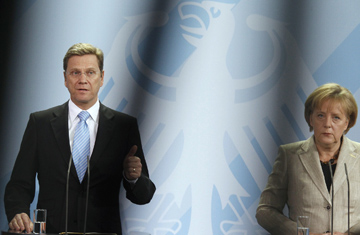
Guido Westerwelle, German Foreign Minister and leader of the liberal Free Democratic Party, and Angela Merkel, German Chancellor and leader of the Christian Democratic Union, address the media in Berlin on May 10, 2010
Germany's center-right coalition was trounced in a key regional election on Sunday, May 9, as voters in the country's most populous state turned their backs on Chancellor Angela Merkel's conservative party just days after her government pushed through an unpopular multibillion-dollar bailout for Greece.
The Christian Democratic Union (CDU) won just 34.6% of the vote in North Rhine–Westphalia on Sunday, down 10 points. The CDU's junior partner, the liberal Free Democratic Party (FDP), scraped together only 6.7%, spelling an end to the coalition's majority in the state. And as the conservatives drowned their sorrows, the opposition Social Democrats (SPD) were popping open champagne bottles as their party polled 34.5% of the vote, narrowly behind the conservatives and short of an outright majority. For the SPD, this election was a homecoming of sorts — North Rhine–Westphalia had traditionally been an SPD stronghold, with the party ruling for 39 years until the 2005 election. The charismatic SPD candidate, Hannelore Kraft, told the crowd that the results on Sunday "sent a message from North Rhine–Westphalia to the whole country: the Social Democrats are back."
Because neither of the two main parties secured a majority, it's not yet clear which coalition government will emerge as the winner. The Social Democrats claim that the result gives them the right to appoint Kraft as the governor to head a new coalition government, which could include the Greens (who won a record 12.6%) and the ex-communist Left Party (who won 5.6%). But a so-called grand coalition between the Christian Democrats and the Social Democrats is also possible.
Sunday's vote was seen as the first major electoral test for Merkel's government since last September's general election. And Merkel knows only too well that her government was to blame for the rout in the regional poll. "We suffered a bitter defeat," the glum-looking Chancellor told a news conference in Berlin on Monday. She admitted there had been too "many contradictions" and "arguments that could have been avoided." She said, "Instead of supporting the government in North Rhine–Westphalia, we put up hurdles."
The election result in the region will have a direct impact on Merkel's government in Berlin. From now on, Merkel's Christian Democrats and the liberal FDP will no longer have a majority in the Bundesrat (the upper house of Parliament), which represents Germany's 16 states, meaning opposition parties may be able to block key legislation in the future. "Chancellor Merkel will have trouble pushing through important laws, like health reform or extending the lifespan of Germany's nuclear power plants, and governing will become far more difficult," Oskar Niedermayer, a professor of political science at the Free University of Berlin, tells TIME. He says the election should serve as a "warning shot" to the Chancellor: "Merkel is under serious pressure — after all the wrangling in her coalition government, she has to show leadership now."
Already Merkel is facing a growing chorus of criticism from within her own party. On Monday, conservative governors from other states called on Merkel's government to change course and end the bickering over tax cuts and energy policy that has plagued her coalition over the past eight months. "We've experienced for the umpteenth time that the conservative CDU party is stagnating, with just 35% of the vote," Peter Müller, the CDU governor of Saarland, told the Handelsblatt newspaper on Monday.
The election campaign in North Rhine–Westphalia was mainly about regional issues such as education and cuts in public spending — but then came the May 7 vote by Parliament to give the green light to the Greece rescue package. With a majority of Germans still bitterly opposed to footing the bill for what they see as Greece's reckless spending habits, pollsters say the drawn-out debate over the aid cost Merkel's conservative party crucial votes. "Chancellor Merkel hesitated over the Greek bailout, and the whole issue stirred up public fears over the economy, unemployment and the stability of the euro," Manfred Güllner, head of the Forsa polling institute, tells TIME.
And Merkel may have just made things harder still for her ruling coalition. On Monday she ruled out the possibility of tax relief, one of her government's key election pledges last fall. "Tax cuts can't be implemented in the foreseeable future," Merkel told reporters, pointing to Germany's budget deficit as the reason. "Consolidating the budget will be the priority," she explained.
Dropping those tax cuts will come as a heavy blow to Merkel's FDP partners, who put tax reform at the center of their election manifesto. "It's now up to the FDP to cooperate more with the conservatives, and they have to get back in line," says Güllner. Merkel said she'd already spoken to her squabbling coalition partners, FDP and the Christian Social Union, about the U-turn on tax cuts and assured that they were "in agreement." But it's too soon to tell if that is enough to stop support for the coalition from bleeding away.
